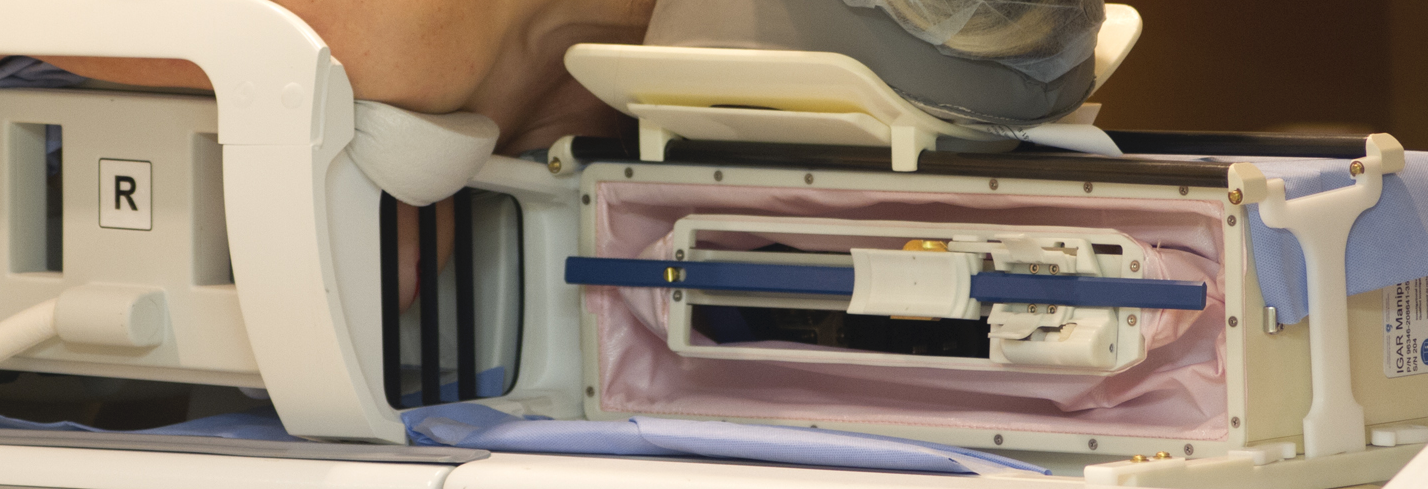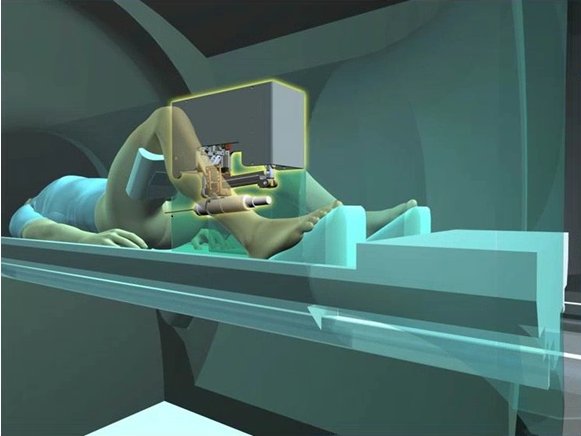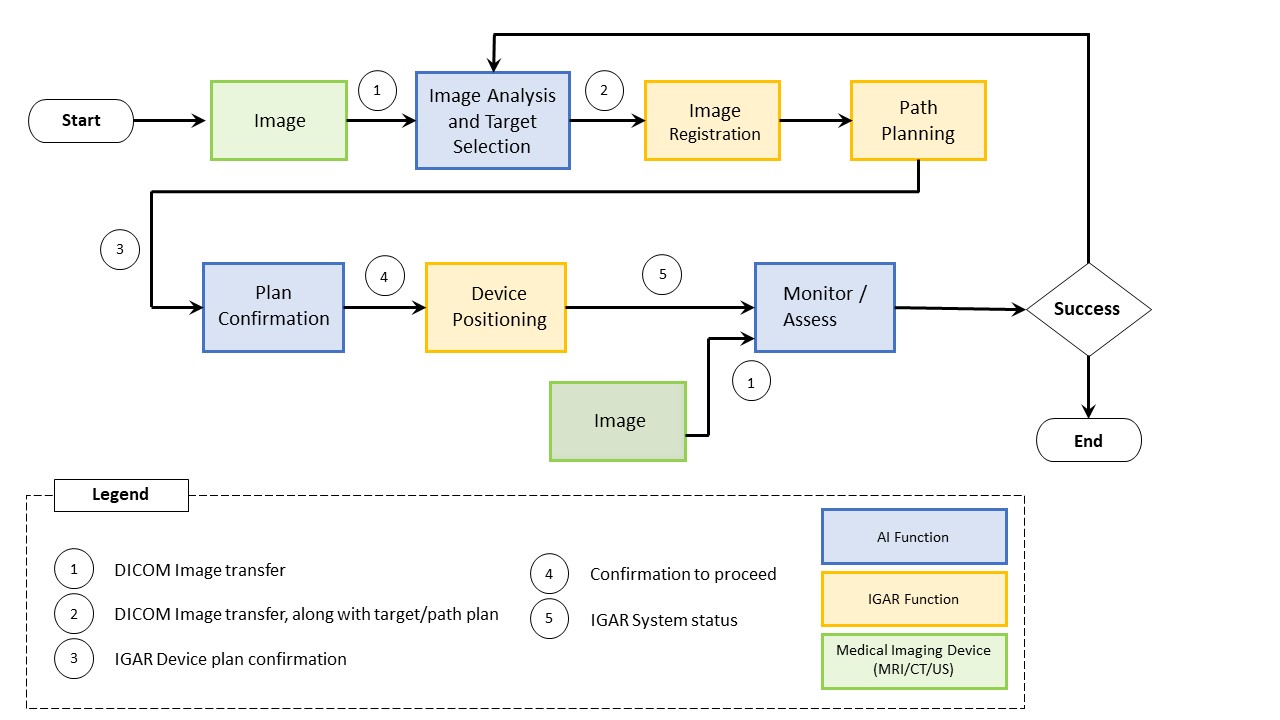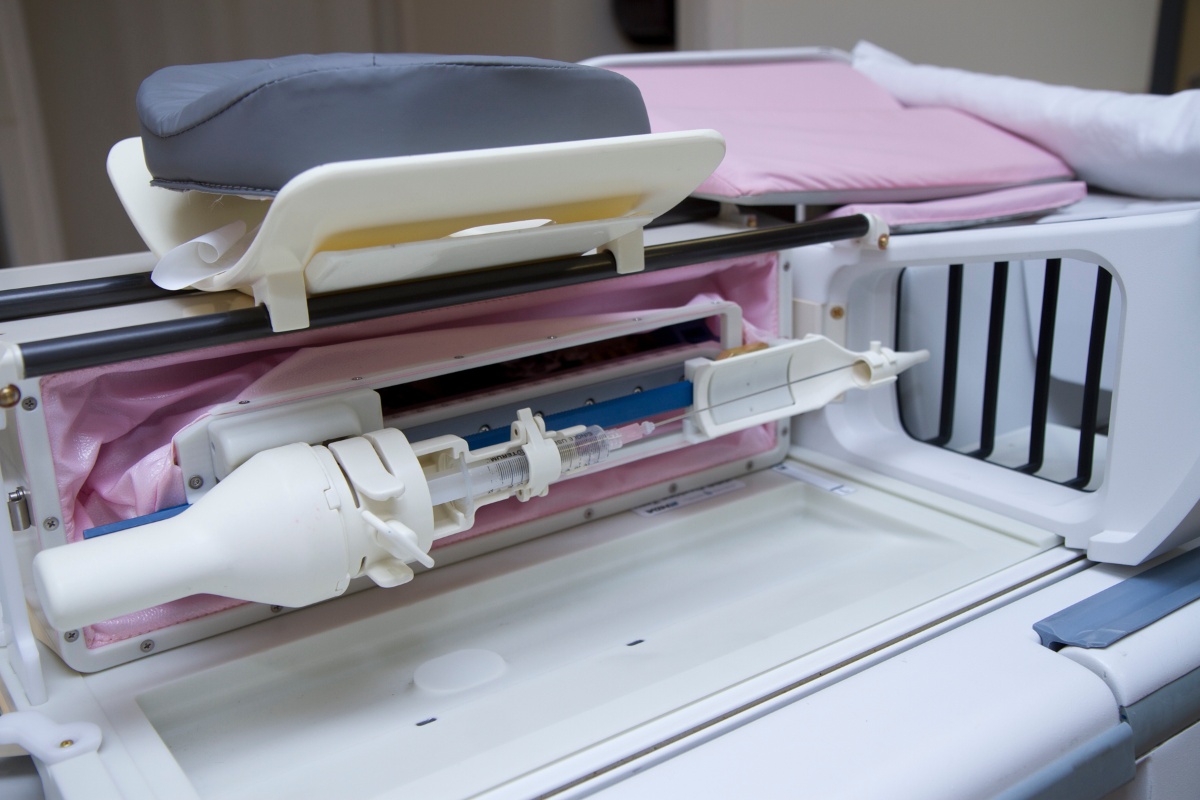IGAR for Early Detection and Treatment of Breast Cancer
The primary product under development is IGAR: Image Guided Automated Robot. IGAR acts in an automated fashion carrying out actions pre-planned by a physician. It is capable of functioning in an MRI bore and can be adapted for any needle-based intervention in any part of the body under various imaging modalities. Such a system can be used for accurate early diagnosis and treatment of early cancers and offers many benefits to the patient (less pain, accuracy, faster treatment), the physician (skill enabler, real-time approach), and the hospital (fewer patients to the OR, faster biopsy time). The ability for preprogramming also introduced the option for tele-operability, which addresses the accessibility challenges for patients living in remote locations.
CSii’s primary R&D focus has been the development and testing of an Image Guided Automated Robotic (IGAR) Breast Biopsy device to increase the effectiveness of surgical care and treatment for breast cancer patients. CSii has created partnerships with other experts in academia in Ontario, Canada and globally to develop an image guided medical robotic platform that will have the flexibility to perform a significant number of procedures in diverse environment types.
Following a successful Phase I clinical trial, in 2018 CSii concluded a dual arm multi-site Phase II clinical trial. In this study, 48 patients were consented and 21 had a successful IGAR biopsy, 20 had a successful manual biopsy. Results from these trials show that IGAR-Breast is capable of safely, accurately and effectively working in an MRI environment.

In 2015, CSii was awarded a $626,030 contract with the Department of Public Works and Government Services Canada through the Build in Canada Innovation Program to test the teleoperative capabilities of IGAR.
Teleoperation enables a remote clinician to control the robot in a different location over a network instead of performing the procedure in person in a specialized suite. A teleoperated robotic system can connect community-based hospitals with limited resources and expertise to large teaching hospitals. This would reduce the burden of highly in demand expert physicians and directly shift the diagnosis and treatment of many disease conditions from the operating rooms to simpler interventional suites, allowing improved healthcare access for millions of Canadians.
CSii has successfully completed proof of principle testing for this project. This year we plan to conduct a teleoperation across 2 different locations with the patient at one site and the radiologist operating IGAR at a remote site.
We are currently working on MR-guided Brachytherapy treatment for prostate, liver and breast cancer. With the success of IGAR-Breast, the team at CSii is working to expand IGAR’s capabilities to include multi-modal imaging and needlescopic interventions for treatment of many different early cancers.

The IGAR-IBM Deep Learning project was sponsored by the Canadian Space Agency (CSA). In 2019, CSii successfully merged IGAR software with IBM’s Cognitive Computing System to conduct proof of concept testing on an autonomous IGAR system. This research was conducted on breast phantoms with embedded lesions identifiable during MRI imaging. We successfully demonstrated the ability of our system to identify the suspicious lesion, plan a needle biopsy trajectory and conduct a needle biopsy with high degrees of accuracy and without human interaction.

CSii is now developing a fully autonomous IGAR system that is capable of screening, diagnosing and treating early breast and prostate cancers – 2 of the most common cancers in Canada.
To achieve this goal, we have put together an interdisciplinary research team that represents a balanced intersection between expert leaders in the fields of robotics, AI, imaging, surgery, and oncology. Dr. Mehran Anvari is the project’s principal investor (PI) and the Scientific Director and CEO of the Centre for Surgical Invention and Innovation. He is a world-renowned pioneer in the field of medical robotics. Dr. Anvari will oversee all aspects of the project including robotic design and system testing in collaboration with the MDA team led by Mr. Tim Fielding. Dr. Aaron Fenster is the CEO of the Centre for Imaging Technology Commercialization and an internationally recognized pioneer in the development of image-guided interventional systems. IBM Canada Master Inventor Dr. Marwan Sati and his team will facilitate the integration of IBM technology to allow for autonomous diagnosis and intervention planning, and communication of image coordinates to the robot through medical imaging standards.
These experts will work in close collaboration with a team of specialists in the fields of radiology, oncology, imaging, and breast and prostate interventions to develop and clinically test the first fully autonomous medical robotic system. As well, we recognize systemic barriers that create a gender divide in this field and strive to create an equitable research team that draws strength from diversity in intellect, and varied life experiences. This project will benefit from the unique perspectives and specialized training of Dr. Tran, Dr. Detsky and Dr. Paudel, while providing valuable opportunities for these Early Career
With the success of IGAR, CSii aspires to build on Canada’s leadership in the field of robotics (Canadarm1 & 2 and Dextre) to spearhead the AI revolution in the field of medical robotics. In collaboration with CSA, we aim to expand IGAR’s functionality to build autonomous image guided robotic systems capable of screening, diagnosing and treating a variety of medical and surgical emergencies in both extra-terrestrial and terrestrial environments. These systems will advance Canada’s stated position to take a leadership role in the provision of medical/surgical care of the crew in future long-term space missions (CSA Deep Space Report, 2017), particularly on a journey to MARS (2-2.5 years duration). The system will also provide much needed capabilities in terrestrial situations when patients may require emergency surgical care in the absence of a physician such as in remote locations, at the scene of an accident, or during natural disasters or pandemics. By using AI to synergize expert human knowledge into a system capable of independent diagnosis, planning and action, we can transform the treatment of cancers as well as other surgical and medical emergencies to provide immediate necessary care when limited access to experts is available – whether that be here on earth or in space.


